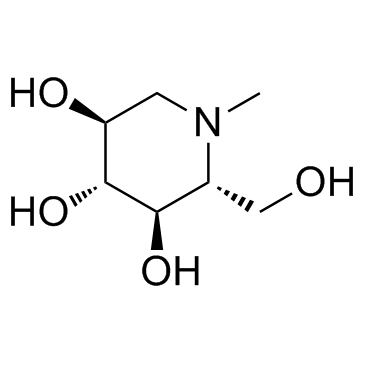N-Methylmoranoline (MOR 14) (Synonyms: N-Methyl-1-Deoxynojirimycin, N-methyl DNJ, N-methyl dNM, N-Methylmoranoline, MOR 14) |
| Catalog No.GC30637 |
N-Methylmoranoline (MOR 14) (MOR 14) is an α-glucosidase inhibitor.
Products are for research use only. Not for human use. We do not sell to patients.

Cas No.: 69567-10-8
Sample solution is provided at 25 µL, 10mM.
N-Methylmoranoline (MOR 14) is an α-glucosidase inhibitor.
N-Methylmoranoline dose-dependently decreases the α-1,6-glucosidase activity in rabbit heart extract. The myocardial uptake of a considerable amount of N-Methylmoranoline is sufficient to fully inhibit alpha-1,6-glucosidase. Preischemic treatment with 25, 50, and 100 mg/kg of N-Methylmoranoline dose-dependently reduces the infarct size without altering the blood pressure or heart rate[1]. MOR-14 significantly increases levels of PKC-ε in the particulate fraction at 20 and 30 min of ischaemia and in the cytosolic fraction at 30 min of ischaemia[2].
N-Methylmoranoline decreases the alpha-1,6-glucosidase activity to approximately 20%, reduces the glycogen breakdown, and attenuates the lactate accumulation at both 10 and 30 minutes of ischemia[1]. MOR-14 is protective against postischemic left ventricular dysfunction through the inhibition of glycogenolysis in the isolated rat heart[3].
[1]. Arai M, et al. N-methyl-1-deoxynojirimycin (MOR-14), an alpha-glucosidase inhibitor, markedly reduced infarct size in rabbit hearts. Circulation. 1998 Apr 7;97(13):1290-7. [2]. Arai M, et al. Role of protein kinase C in the reduction of infarct size by N-methyl-1-deoxynojirimycin, an alpha-1,6-glucosidase inhibitor. Br J Pharmacol. 2001 Jul;133(5):635-42. [3]. Nishida Y, et al. N-methyl-1-deoxynojirimycin (MOR-14), an alpha-glucosidase inhibitor, markedly improves postischemic left ventricular dysfunction. Heart Vessels. 2000;15(6):268-73.
Average Rating: 5 (Based on Reviews and 40 reference(s) in Google Scholar.)
GLPBIO products are for RESEARCH USE ONLY. Please make sure your review or question is research based.
Required fields are marked with *




















